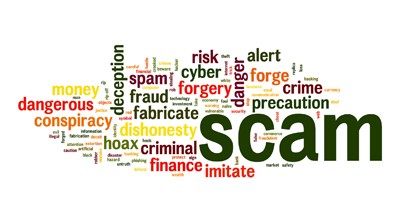Scams, fraudsters and viruses
Almost every Australian will be aware of the problems trying to complete the online Census on the 9th August 2016.

One of the excuses was that there was criminal activity to hack the government’s website.
The Australian Taxation Office, the banks, Australian Securities and Investments Commission and consumer organisations are constantly warning us to be on our guard us to the dangers of unsuspecting criminal activity.
A few more illustrations:-
Your Hotmail account doesn’t work and you look up a help desk on Google. The first Advertisement to come up has a 1300 number, you call it and there is an $11 charge for their assistance. By the end of the day the withdrawals can be $2,000, $5,000, what is the limit of your account? Money gone and now you have to fight with the bank over your naivety.
Are you insulted by this? I hope it means you will remember the illustration.
Consumers are constantly providing credit card details over the phone and every time you do so, you do so at your peril.
The risk is much greater if you have received the phone call, rather than calling a reliable source.
Whilst the victim above might blame Google for false advertising and participating in criminal activity, it reverts to you – be vigilant!!
The old technique was to have people draw cash from their bank, take it to the Australian Post to have it sent to Wells Fargo. The new scam is even easier! “We need $500 on an ITunes card. You buy the ITunes card from the supermarket with your credit card”. Who cares how you pay for it. The ITunes card is as good as cash.
As reported in the earlier scam warnings, it almost is at the point where you shouldn’t answer the telephone, nor look up a phone number on any resource connected with the internet.
Another tip. If you receive an e-mail that looks to be correct check the address it has been sent from before clicking. It might say it comes from Australia Post, the ATO or the Australian Federal Police but the sending address is nothing like what these organisations might use. Having said that, be aware of sender addresses that are close. An example can be a similar name but only .com rather than .com.au.
If in doubt ring the organisation in question but NEVER NEVER click before you're satisfied.
AcctWeb
Hot Issues
- What is a Commercial Lease?
- 8 tips to improve your online sales
- ATO cracking down on tax dodgers trying to leave the country
- Digital Assets You Forgot You Own (and Why They Still Matter at Tax Time)
- ‘Not insurmountable’: What accountants need to know ahead of Payday Super
- Heading overseas? Centrelink and the ATO might need to know
- The ATO’s new draft rules could change your holiday home tax claims
- Which country produces the most electricity annually?
- Restructuring Family Businesses: From Partnership to Limited Company
- Choose the right business structure step-by-step guide
- ATO’s holiday home owner tax changes spur taxpayers to be ‘wary and proactive’
- Payday Super part 1: understanding the new law
- A refresher on Medicare levy and Medicare levy surcharge.
- Protecting yourself from misinformation
- Super gender gap slowly narrows
- Countries with the largest collection or eucalyptus trees
- Benchmarks for small business
- Right to Disconnect
- There’s $18.9 billion in lost and unclaimed super - some may belong to you
- Small businesses remain optimistic despite high stress, report reveals
- Tax and your child’s money: what parents need to know including TFNs
- How to declare minor children’s income
- Net cash flow tax: What is it and what will it mean for SMEs?
- Bribery, brothels, breaches of confidence: ATO officer loses appeal against imprisonment
- Why Culture Matters (Even in Small Teams)

